- Home
- Ian Buruma
Anglomania Page 2
Anglomania Read online
Page 2
The Hague was a smallish town with aspirations to a grand style. This style was inspired by (when not a direct imitation of) foreign manners and fashions. The architecture of Louis XIV was copied at the end of the seventeenth century. Two hundred years later, and in some cases long after that, smart people still spoke French at home. Adopting the manners of a foreign elite is a way for local society to feel distinguished. Since Amsterdam was the only real city in Holland and Rotterdam the center of commerce, a grand style was essential for The Hague to dress itself up as being something more than a provincial capital. This lends to parts of The Hague a peculiar staginess: the perfect setting for people who like official decorations, protocol, and the subtleties of placement at diplomatic dinner parties.
There were still remnants of the grand manner when I grew up in The Hague. Upper-middle-class matrons would insist on pronouncing certain Dutch words à la française. Old colonials from the Dutch East Indies—most of whom settled in The Hague—would dress up in tropical suits and order rijsttafels at old-fashioned restaurants as though they were still at the club in Batavia. And gossip was still exchanged in drawing rooms around the Lange Voorhout, or an area known as Benoordehout, literally “North of the Woods,” about this ambassador or that. But the predominant style among “Our Kind of People” (Ons Soort Mensen, or O.S.M.) had become English instead of French.
North America was respected for its wealth and power, but Britain held a singular fascination for the snobs, that is to say, much of The Hague’s elite. Churchill’s Britain had fought off a Continental tyranny to preserve its liberal institutions. But something else had survived in Britain, or perhaps I should say England, something Shakespeare called degree and we call class. Class distinctions exist everywhere in Europe, but after World War II there were few traces left of an ancien régime, even in the Continental monarchies, no aristocratic upper houses, no great landowning dynasties. Some of the names had survived, but they played no significant part in public life. What was unique, and therefore so fascinating about England, was not the mere survival of aristocracy but the survival of an aristocratic style aspired to and imitated by the upper middle class.
Elements of the Dutch bourgeoisie, perhaps more than was later admitted, were attracted before the war to the German idea of a Nordic Herrenvolk, as indeed were some English aristocrats. North of the Woods Anglophilia might be superficially related to this. But I don’t think so. What the Anglophiles admired was not so much aristocracy, let alone a racial elite, but something both more liberal and more bourgeois than that: the gentleman, whom André Malraux once called England’s grande création de l’homme. A bourgeois man with aristocratic manners, a tolerant elitist who believes in fair play: the image of the English gentleman, bred rather than born, appeals to snobbery and liberalism in equal measure. North of the Woods bristled with would-be English gentlemen.
North of the Woods is not a grand place. There are no particularly grand houses. It is much like those English suburbs mocked in Bateman cartoons. I associate the summers of my childhood with the monotonous swish-swish of garden sprinklers and the smell of freshly cut grass. Winter or summer, the streets always looked immaculate and dull. But there, mowing those lawns and working those sprinklers, were the doctors, dentists, lawyers, and bankers in their blue blazers, English brogues, and club ties: the Anglophiles. Grown men would sit in the wooden pavilion of The Hague Cricket Club with transistor radios pressed to their ears, following the latest Test Match results in England. “Cowdrey’s out!” one would shout, or “Trueman’s got a wicket!” All this exclaimed in Dutch, but with the drawl of North of the Woods gentility. It is a sound easier to imitate than to describe on paper: something between a goose’s honk and a duck’s quack.
The Anglophiles took the badges of their peculiar identity seriously. They were almost fetishistic about them. It is possible to write a study on the significance of the club tie alone. The yellow and black cotton HCC tie was readily available at designated sports shops. But there was more prestige in wearing the yellow and black tie of Clare College, Cambridge, which was made of silk and had to be bought in England. Anyone traveling to England would get so many requests to purchase this item at a special club tie shop in Margaret Street, London W1, that he would come back laden with neckwear, like a traveling salesman.
Brogues were another sartorial fetish. Many shoe manufacturers made these shoes with ornamental holes, originally designed to let water drain out when one went sloshing through Scottish peat bogs in the rain. But not every kind of brogue would do. Only the classic English brogue was acceptable. Oddly, other types of English shoes, more popular in England, were not. The elastic-sided Chelsea boot, for example, was considered too eccentric. A young HCC cricketer once came back from England with a pair of suede Chelsea boots. No matter how he tried to convince his friends that these were absolutely fine in England, in their eyes they still looked ludicrous.
The English style was never adopted wholesale. Authenticity was not the point. I was an oddity as a boy in The Hague because my mother liked to dress me up in long flannel shorts and knee socks, like an English schoolboy. Authenticity, divorced from its context, is absurd. To my peers, my Marks and Spencer outfits made me look like Little Lord Fauntleroy. When I was at secondary school, in the middle 1960s, the fashion in North of the Woods was to wear imported British college scarves with colored stripes. I had one of those, with black and yellow Clare College colors, worn wrapped around my neck with studied nonchalance. But then my grandmother bought me a double-breasted overcoat at a school outfitters in London. This was a step too far. It was the sort of coat only elderly bankers might have worn in Holland, before the war.
Anglophilia is of course a fantasy, like all forms of “philia,” which can easily degenerate into a form of pretending to be something you are not. My view of England was no less fantastic than that of my friends at the HCC, but it was fed by knowledge they didn’t have, by Boy’s Own annuals and comics about British schoolboys winning football matches and British heroes winning the war, killing cartoon Germans who were all named Fritz. I consumed British fantasies about Britain, without being British. This caused a certain amount of confusion, more to do with nationality than with class. In my case, the fetishism of the club tie was infinitely expanded: I made a fetish of nationhood itself. To be more English I would spend hours imitating my mother’s handwriting, as though something of the effortless English superiority, something of my grandfather’s Berkshire landscape, some vital if undefinable essence of Englishness would rub off.
But what was my grandfather’s landscape, this English way of life glimpsed during school holidays, which seemed so much more glamorous and desirable to me than our perfectly good life in The Hague? My grandparents’ house: I still go there sometimes to look at what is left of it. I park my car furtively in the drive and gaze at the old Victorian vicarage, so white, so large, so warm in my memory, and so remote now. It has had several different owners since my grandparents sold it, and several coats of paint. The color changed from white to gray, and back to white again. It seems to have shrunk since I was there as a boy. Details have been fixed. The gardener’s cottage is now a weekend house with glazed windows. The chicken coops, where I used to collect eggs, are gone. And the garden that seemed to stretch for miles up to “the fields,” where cows grazed beyond a row of beech trees, looks smaller, more fenced in, than the way I remember it. The M4 cuts through the fields now. You can hear and see the traffic rushing past a petrol station and “service center” built on the old runway of a wartime aerodrome, which, when I first saw it, was already overgrown with weeds.
Impressions come flooding back, which, when I think about them, seem too quaint, too stereotypical, too Merchant Ivory, to have been true: people drinking sherry on the terrace; village fêtes on the lawn; my grandmother, in brown gardening shoes caked with fresh mud, carrying hampers filled with vegetables; cooked breakfasts kept warm under silver covers; The News of the World and the
smell of stale sweat and cigarettes in the cook’s tiny backstairs room; cavernous linen cupboards; a larder smelling of cheese and butter; picture books of Lancaster bombers, left behind by uncles who were children during the war; the crunching sound of cars rolling up the drive. When the sun wasn’t shining, it was snowing. It was never simply dreary. For it was a childhood idyll that memory has turned into a vision of Arcadia, like a sentimental Christmas card.
And it was there, in that Arcadian house, that I first realized that foreigners were funny. Our name was funny, our accents were funny. Amongst ourselves, my sisters and I spoke Dutch, which was particularly funny. I also concluded another thing, not entirely unrelated to the funniness of foreigners, something that was never openly stated, at least not by my own family, or at least not until my grandfather’s mind started wandering and his opinions coarsened. It was something I could not but conclude from the huge lawns, three-course breakfasts, four-course lunches, daily high teas, and stacks of presents at Christmas: the absolute superiority of life in England.
There was, however, something unusual about this childhood Arcadia. My grandparents were both children of German immigrants. Their parents had once been foreigners too. The very English life I observed at the house in Berkshire had been the result of conscious decisions, considerable effort, and a kind of stoicism. My great-grandparents decided to give their children the most English education available. My grandparents had broken out of a narrow Jewish émigré community in North London. And they had been stoical when others chose to see them as being less British than they did themselves. My own Arcadian view of England was linked to these decisions and these efforts, for I learned to look at England largely through my grandparents’ eyes.
This was not something my fellow North of the Woods Anglophiles could share. Their concern was, as I said, class snobbery, to which I myself was by no means immune. I sat up on the balcony of the cricket club pavilion with the other boys, calling out “rug merchant,” before withdrawing our heads like turtles, whenever Mr. W. walked by in his cavalry twill trousers and his Clare College tie, with a copy of The Daily Telegraph rolled up in the pocket of his immaculate blue blazer. Mr. W. was a handsome man with dark shimmering hair. He was perhaps a little overgroomed, a little louche even, with a fondness for hair oil and tinted glasses. His older wife was a large and overdressed woman who had inherited several grand hotels. The rumor got around, even to us younger boys, that Mrs. W. had married her husband for his looks, and that before his turn of fortune Mr. W. had been in charge of laying the carpets in one of her hotels. We sniggered at the rolled-up English newspaper, which he never appeared to read. We sneered at his lounge lizard hairdo. We mimicked his accent, which, to our exacting ears, was a touch off. The sin of Mr. W. was not that he lacked Englishness, despite all the trappings, so painstakingly assembled. His sin was that he lacked class.
We were much more forgiving toward real Englishmen. Members of visiting English cricket teams rarely lived up to the idealized image of the English gentleman. They were Rotarians from the Midlands, car dealers from Kent, or policemen from the outer suburbs of London. Few, if any, matched their hosts in the blazer and brogues department. There might have been the odd club tie, but that was it. And if they didn’t look like David Niven, they didn’t speak like him either. But this did not really matter. British guests were not expected to live up to the semiotics of Dutch class divisions.
THEN CAME THE sixties. The English club tie began to lose some of its magic as the decade unfolded, even North of the Woods, but for the younger generation the glamour of Britain got a boost from the Beatles, the Who, and the Rolling Stones. For the second time in twenty years liberation came from the West. It was as though Glenn Miller and Lucky Strikes hit Europe once again, this time with a louder beat. But the second wave of Anglo-American liberation was different. What gave British youth culture its zest was the rude working-class challenge to middle-class boredom and complacency. Such emblems of British respectability as the national flag, the King’s English, old school ties, brogues, or having enjoyed a “good war” were treated as jokes. These signals were not always picked up accurately on the European Continent, but we heard the beat and knew something exciting was going on. Instead of coming back from holidays in England wearing college scarves and gabardine coats, I now sported a powder blue Beatles hat from the King’s Road.
British working-class heroes have their own peculiar attractions. In a way, Britain was the only western European country that still had a true working class, with its own class traditions and culture, in which it took pride. This, too, was part of the ancien régime. While revising this chapter, I had tea with a German-born British peer. We were sitting in the tearoom of the House of Lords, me in my jacket and tie, he in his pin-striped suit (Gieves & Hawkes, Number 1 Savile Row). He had had a distinguished career as a German social democrat before deciding to become an Englishman. He had been a classic liberal Anglophile. “Well, well,” he said, “well, well …,” and he took a sip from his cup of tea. There was a look of deep sadness on his face as he gazed on the gray gloom of the Thames outside. “What one admired about this country,” he said in his soft German accent, “was the aristocracy and the working class. Now that Britain has become a middle-class nation, it’s no longer any different from anywhere else in Europe.” He sighed, resigned to his melancholy. “Well, well,” he said, “well, well.”
What attracted Europeans of my generation, however, was not the culture of miners’ brass bands, trade unions, or cheery pub songs; it was the culture of rebellion. Perhaps there was a tenuous link between this—pop music and rebellious attitudes—and earlier forms of Anglophilia, rooted in the revolt against absolute monarchy. There was even a link with aristocracy. While imitating American rock and roll, many British pop groups expressed an aching nostalgia for a pre-American England, an Edwardian or even Regency England of music halls and dandies, striped blazers and Crimean War uniforms. The past was treated with irony but with a melancholy longing too, for a kind of aristocratic hedonism. It was as though a generation of working-class children had raided a vast stately home and dressed up in the master’s old clothes. When British pop stars struck it rich, many of them bought stately homes and lived like stoned lords and ladies. This gave them a sense of style that had no Continental parallel, for we had no ancien régime. It was theatrical, nostalgic, ironic, exciting, and intensely commercial.
Perhaps that’s why Anglophilia thrives in seaports and trading places, such as Hamburg, Lisbon, Milan, and cities on the Dutch coast. When merchants get snooty, they become Anglophiles. There was no more snobbish, more Anglophile city than prewar Hamburg, with its yacht clubs, horse racing, and quasi-rural suburbs. Wealthy shipowners continued to send their sons, named “Teddy” or “Mickey” or “Bobby,” to British boarding schools well into the 1930s. They were hurt and bewildered when British bombers destroyed much of their city in one moonlit night in 1943. But to say that Hamburg Anglophiles were snobbish is not to say they were reactionary. On the contrary, like most seaports, “the Free and Hanseatic City of Hamburg” has a long liberal tradition. Merchants can’t afford to be reactionary. Their snobbery is a sign of social mobility, of acquired airs and graces, not of birthright or noble privilege.
The Hague was never a city of traders. But it became known as “the mightiest village in Europe” during the seventeenth century, when it was the capital of the Dutch Republic, a maritime trading power facing Britain as its main partner and rival. The Hague would never be mightier than during that Dutch Golden Age. Hugo Grotius developed his doctrine of freedom of the seas there. Forbidden books from France and elsewhere were published there. But things began to slide in the eighteenth century. The lowest point for The Hague, and the entire western province of Holland, was when Napoleon enforced the Continental System, which outlawed trade with Britain. Well, perhaps not quite the lowest point.
A few years ago I came across a curious book in a secondhand bookshop in Amsterd
am. It was a German book entitled Face of the Netherlands, published in Berlin in 1943 and written by one SS Obersturmführer Ernst Leutheusser. This fascinating document, illustrated with pretty black-and-white photographs of churches, canals, cheese markets, blond children in regional dress, and industrious farmers with stern “Nordic” faces, was a kind of guidebook for SS officers posted in the occupied Netherlands. The picture of Holland is by no means hostile; on the contrary, the author emphasizes the fraternal relationship between two Nordic peoples. The historical nature of that relationship is explained by the SS Obersturmführer.
There are really two parts of the Netherlands, he says. There is the authentic, eastern half of the country, largely agricultural, facing Germany and populated by people of good Saxon stock who feel they are part of Europe. (Europe is, so to speak, in their blood.) Then there is the western seaboard with its cities, dominated by merchants, looking toward Britain and the oceans beyond for opportunities to enrich themselves through trade. This is the “deracinated” half of Holland, dependent on “Britain and other anti-European powers.” The western merchants and patricians have turned against their European roots. Regrettably, their “materialistic, bourgeois-capitalist mentality” has infected the rest of the country, resulting in its increasing “alienation from Europe.” But we should rest assured, for under the benevolent tutelage of the Third Reich, this would all soon be put right.

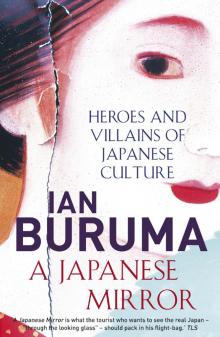 A Japanese Mirror
A Japanese Mirror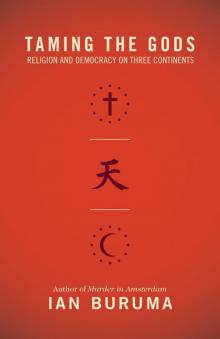 Taming the Gods
Taming the Gods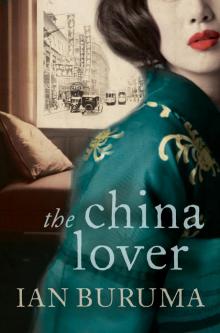 The China Lover
The China Lover A Tokyo Romance
A Tokyo Romance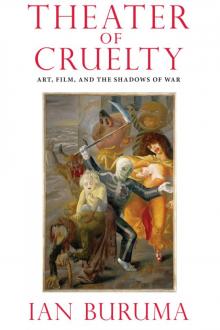 Theater of Cruelty
Theater of Cruelty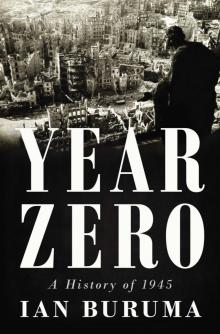 Year Zero
Year Zero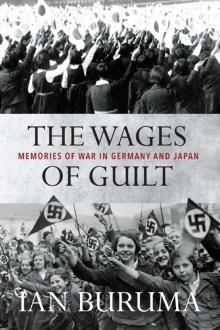 The Wages of Guilt
The Wages of Guilt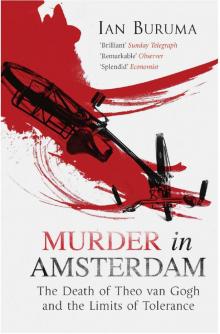 Murder in Amsterdam
Murder in Amsterdam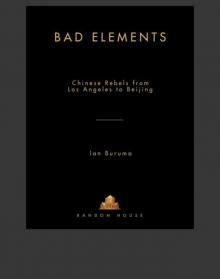 Bad Elements
Bad Elements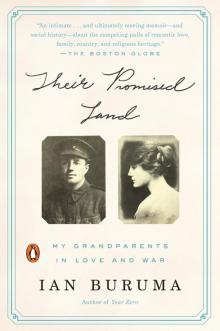 Their Promised Land
Their Promised Land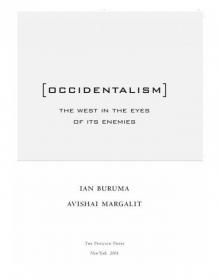 Occidentalism
Occidentalism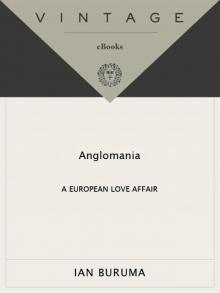 Anglomania
Anglomania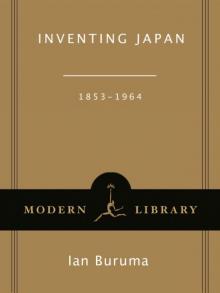 Inventing Japan: 1853-1964 (Modern Library Chronicles)
Inventing Japan: 1853-1964 (Modern Library Chronicles) The Missionary and the Libertine
The Missionary and the Libertine